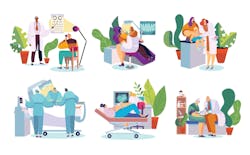On Thursday, May 14, a group of nine national healthcare professional associations sent a letter to Seema Verma, Administrator of the Centers for Medicare & Medicaid Services (CMS), asking her to take steps to provide flexibility for provider organizations participating in federal accountable care organization (ACO) contracting, and to help protect providers from potentially harmful losses created by the COVID-19 pandemic.
The Washington, D.C.-based National Association of ACOs (NAACOS) published a press release about the action on its website. As the press release stated, “Expressing a desire to maintain momentum in the adoption of alternative payment models and participation in accountable care organizations (ACOs), the National Association of ACOs (NAACOS) and eight other leading healthcare organizations wrote Trump administration officials today asking for additional changes to support ACOs, as they and their doctors and hospitals continue to combat the COVID-19 pandemic. In a rule published in the Federal Register on May 8, the Centers for Medicare & Medicaid Services (CMS) provided additional relief from COVID-19 for the Medicare Shared Savings Program, which has been proven to lower the cost of care, improve quality, and hold doctors and hospitals accountable for a fifth of all Medicare patients today. While NAACOS and others were appreciative of many changes in the rule and feel they go a long way to keeping the largest Medicare ACO program afloat, the nine groups hope additional efforts can be made.”
The letter was signed by the American Academy of Family Physicians, American College of Physicians, American Medical Association, American Medical Group Association, America’s Physician Groups, Association of American Medical Colleges, Medical Group Management Association, NAACOS, and the Premier healthcare alliance.
The nine groups asked Administrator Verma to do the following:
Specifically, the groups asked CMS Administrator Seema Verma in a letter to:
• Address the continued uncertainty presented by the pandemic by giving ACOs an option to be fully protected from losses in exchange for a reduced shared savings rate of no less than 40 percent;
• Extend the current deadline to voluntarily terminate their participation in the Shared Savings Program to no sooner than October 31;
• Reverse its decision to cancel the 2021 Shared Savings Program’s application cycle; and
• Pay ACO shared savings payments and advanced alternative payment model bonuses as soon as possible.
“We appreciate CMS protecting shared savings opportunities for ACOs while working to mitigate the negative effects of COVID-19 on ACOs,” said Clif Gaus, Sc.D., NAACOS president and CEO, in a statement included in the press release. “However, there is still a tremendous amount of uncertainty surrounding the pandemic, including when the public health emergency and the protections and support it offers will end. Providing more time for ACOs to determine if they can stay in the program is critical for alleviating concerns about shouldering liability for a global pandemic.”
NAACOS’s press release also stated that “CMS has yet to address the current termination deadline in the Shared Savings Program, which is effectively June 1. Pushing this back will give ACOs more time to understand the implications of the new rules so they can evaluate if they will remain in the program. ACOs are uniquely positioned in the crisis because of their work supporting care coordination and building an infrastructure to support their ACO work,” the press release added. “This includes identifying vulnerable patients, educating patients about minimizing exposure, and managing post-discharge complications with integrated home health and effective relationships with post-acute providers.”
And, the release noted, “Medicare ACO programs now care for roughly a fifth of all Medicare beneficiaries, almost a third without Medicare Advantage, and encompass nearly 500,000 clinicians. There are more than 550 ACOs in the Shared Savings Program and Next Generation ACO Model. Comparing ACO spending to the absence of ACOs found this important Medicare program lowered Medicare spending by $3.53 billion from 2013 to 2017 and saved $755 million after paying shared savings.”


